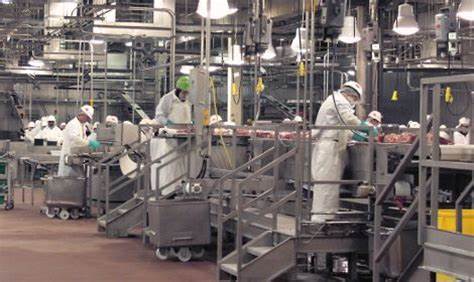And yet, each time he arrived at work, Benjamin saw a different reality emerging.
然而,本杰明每次上班都會看到一個不同的現實。
A quiet, powerfully built man, he wasn't the sort to open up about his fears,
他是一個安靜、體格健壯的人,他不是那種敢于直言不諱的人,
but during daily calls with his three adult children, he confided that he was afraid of getting sick.
但在每天與三個成年子女的通話中,他吐露自己害怕生病。
On March 25 one of his daughters gave him a face mask to wear at the plant,
3月25日,他的一個女兒給了他一個口罩,
where he operated boxing and loading equipment near the entrance and was often the first person to greet arriving co-workers.
讓他在工廠門口附近裝箱和裝載設備時使用,而且他常常是第一個迎接到達的同事的人。
"He was always so respectful," a shiftmate says.
“他總是那么有禮貌,”一個輪班的人說。
Two days later, Benjamin told his kids a supervisor had ordered him to remove the mask because it was creating unnecessary fears among plant employees.
兩天后,本杰明告訴他的孩子們,一位主管命令他摘下口罩,因為這會讓工廠員工產生不必要的恐懼感。
On Saturday, April 4, Benjamin called in sick.
4月4日周六,本杰明請了病假。
So few workers had shown up the day before that he'd had to do the work of three people, he told his family.
他告訴家人,前一天來上班的工人太少了,他不得不干三個人的活。
By Monday his cough and fever were much worse. The next morning he could barely move. An ambulance took him to the hospital.
到了周一,他的咳嗽和發燒變得嚴重得多。第二天早上,他幾乎無法動彈。救護車把他送到醫院。
While he was in the emergency room, Cargill shut down the Hazleton plant to disinfect everything, install barriers between workstations, and give employees time to heal.
他在急診室時,嘉吉公司關閉了哈茲爾頓工廠,對所有東西進行消毒,在工作站之間安裝屏障,并給員工時間進行康復。

Later that week, the union said 164 workers had been infected.
那周晚些時候,工會說有164名工人已經感染病毒。
The local testing center, running low on supplies, was refusing to test most Cargill employees.
當地的測試中心,由于供應不足,拒絕給嘉吉公司的大多數員工進行測試。
If you work at the meatpacking plant, they were told, assume you're positive.
工人們得知,如果在肉類加工廠工作,就假設是陽性。
Benjamin was admitted to the intensive care unit and spent his work anniversary on a ventilator.
本杰明住進了重癥監護室,在呼吸機上度過了他的工作周年紀念日。
He died on April 19. The next day the plant reopened after a two-week cleaning.
他于4月19日去世,第二天,工廠在經過兩周的清潔后重新開放。
The meat industry's failure to protect its employees from the coronavirus has triggered the most serious threat to U.S. meat supplies since World War II.
肉類行業未能保護員工免受新冠病毒的侵害,引發了二戰以來美國肉類供應面臨的最嚴重威脅。
In recent weeks, 115 meat and poultry plants have reported Covid-19 infections in the U.S.,
據美國疾病控制和預防中心的數據,最近幾周,美國115家肉禽工廠報告新冠病毒感染病例,
and about 5,000 workers, 1% of the industry's workforce, have been confirmed sick, with 20 deaths, according to the U.S. Centers for Disease Control and Prevention.
約5000名工人(占該行業勞動力的1%)已證實患病,其中20人死亡。
Outbreaks were so severe that at least 18 plants shut down.
疫情如此嚴重,至少有18家工廠關閉。
U.S. beef and pork production capacity shrank 40% in April, says Will Sawyer, lead economist at agricultural lender CoBank.
農業信貸銀行CoBank首席經濟學家威爾·索耶表示,美國4月份的牛肉和豬肉產量萎縮40%。
U.S. consumers, Sawyer predicts, could see 30% less meat in grocery stores by Memorial Day, at prices 20% higher than last year.
索耶預測,到陣亡將士紀念日,美國消費者在雜貨店看到的肉類可能減少30%,價格則比去年上漲20%。



